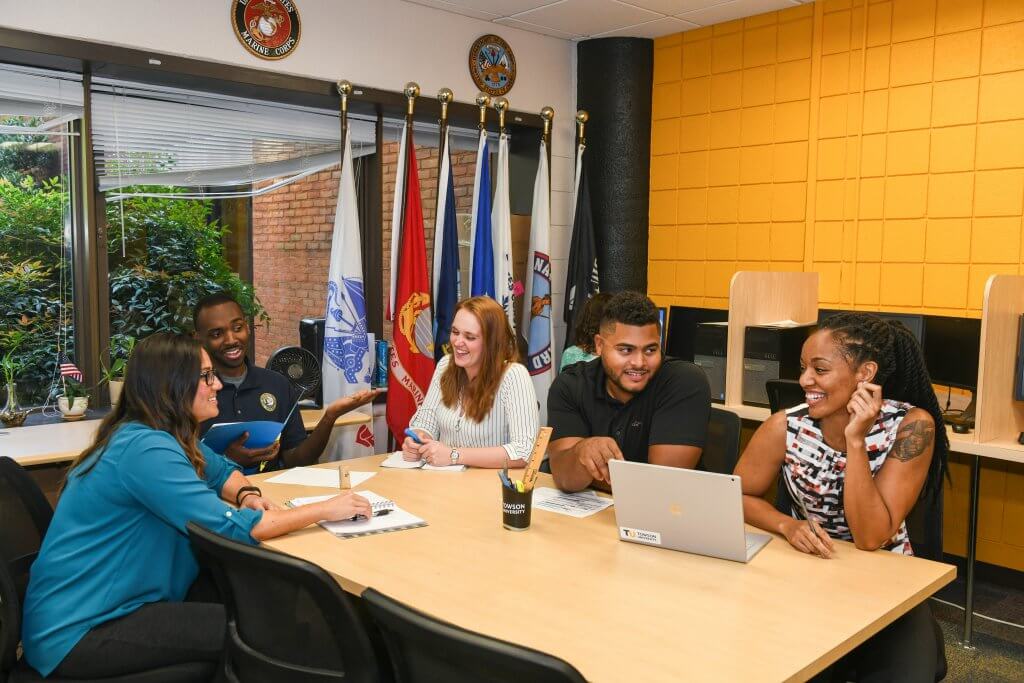Education creates advancement opportunities for sailors, along with broader worldviews for diverse life experiences, according to a first-generation American and Navy veteran.
“There’s so many ways to contribute and be an exceptional member of the Navy. Education can help enhance that,” said Ron Tavares, a Louisiana native who is studying sociology at Towson University in Maryland. “The additional skills that come with applying yourself in acquiring a bachelor’s degree help in attaining critical thinking or problem-solving skills.”
He also serves as a peer support specialist in the university’s Military and Veterans Center to help soldiers and sailors in their academic and career goals. Among the resources for service members is the Navy’s recently restarted Baccalaureate Degree Completion Program (BDCP).
The program, which returned in March, pays reservists a salary while they finish their degree. Then, sailors can pursue Officer Candidate School (OCS) or Officer Development School (ODS).
“It’s a different outlet to gaining a commission than the normal paths,” said Lt. Russell Broussard, an officer recruiter for Navy Talent Acquisition Group Atlanta. “You’re getting paid as active duty while you’re not on active duty.”
BDCP helps ‘get the ball rolling’
Giving students another outlet to become officers is beneficial for the Navy, he said, so the Navy can engage young leaders right out of college. In addition to a salary, the BDCP also issues allowances to relieve financial hardships so students can focus on school.
Navy OS1 Petty Officer James Andrews posted about the program on Facebook shortly after the announcement of its return, and said he wanted to share the new program with reservists.
Andrews, who is two classes away from completing an associate’s degree, said the BDCP benefits sailors who are hesitant about doing bigger and better things with their career. Many junior sailors want to become an officer but their military workload makes college a difficult addition. However, the BDCP gives people who want to be officers another path to OCS or ODS.
RELATED: Oregon adds assistance for fees, book costs to Guard state tuition program
“They can better themselves in a way that they thought would be difficult while they’re active duty,” he said of the BDCP. “This avenue allows you to be in the reserves to get the ball rolling to get your spot in as a commissioned officer.”
Emely Santos, an Army reservist, said bachelor’s degrees are important for anyone’s career and essential to becoming an officer. She is earning a criminal justice degree from the University of Maryland while studying at the Universities at Shady Grove campus.
“I’ve never really seen how you can make a career out of something without schooling,” the Army human resources specialist said. “It would be interesting to see how this program would give everybody an opportunity.”
The BDCP is open to enlisted reservists from all branches if they join the Navy. Designations open to applicants are pilot and flight officers, special warfare (SEAL), special operations and surface warfare officers. Applicants must study at a college without an NROTC unit or NROTC cross-town agreement.
Sailor status ‘tremendously beneficial’
Helping veterans pursue education according to each person’s needs and goals motivates Keith Hauk. The retired Army colonel has taught thousands of veterans at the University of Maryland Global Campus. Hauk said the Navy program’s focus on E-4 or E-6 sailors means those reservists might have families and other life responsibilities.
Sailors in the program pause their military responsibilities while full-time students.
“If they’re going to retain their status as full-time sailors and basically their full-time job is [to] go to school, that’s tremendously beneficial because it takes all the military roles off the table,” Hauk said.
Devon Julien previously earned a degree in military studies while being paid as an E-5 through a similar program. He enlisted as a reservist in the Marine Corps in 2002 and served until 2008. He now works as a brain injury specialist for the Brain Injury Alliance of Connecticut.
“The challenges are already stacked against you,” he said of veterans seeking a degree.
Sailors must adjust to civilian life, often while raising a family, he said. He’s now studying for a health sciences degree at the University of Hartford in Connecticut. More educated sailors make better leaders, he said, because they are more experienced in their fields of study and work.
“The benefits are way better for both sides, the individuals and their families and the Department of the Navy itself,” he said.

